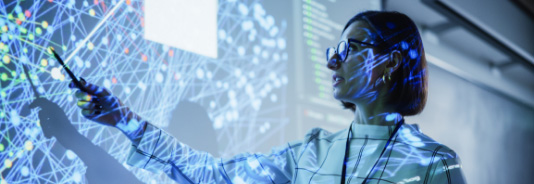

Towards a more human and adaptable city
The digital twin is a virtual representation of Madrid and a real-time representation of the city.
Madrid's Digital Transformation Strategy, Madrid Digital Capital, is committed to boosting digitalisation and promoting intelligent and advanced management of the city. To this end, and through the use of the digital twin, using data, mathematical algorithms, information from sensors, images, etc. with the aim of providing a tool to help municipal management and urban development, through which to understand what is happening at all times, improve the services provided to citizens, businesses and visitors and to simulate and evaluate the implementation of municipal policies on sustainable development, resource management, urban mobility or the planning of security and emergency actions.
It is time for a more empathetic, friendly, accessible and inclusive city.
But at the same time flexible to address all existing challenges in the short and medium term. The city must adapt to each citizen at each moment, so that public service provision is tailored to each individual/group. Cities must become adaptable cities, cities that are able to respond dynamically to all changes and variations, with a citizen-centred vision.

Foundation, report and simulation of public policies, initiatives and services through the analysis of the socio-demographic, physical and environmental conditions of the districts and of their endowments.

Simulation, planning and management of operations and services, analysis of the continuity of services during events and mass gatherings.

Monitoring of infrastructures and support for the management of their maintenance; simulation of the impact of use and adverse conditions on them and support for preventive maintenance.

Information to citizens about places and activities of interest, planning of visits and analysis of mobility options, didactics of activities, services and spaces.
The aim is to design a digital twin platform that provides a flexible, scalable and interoperable solution for various technologies, industries and use cases.
The platform will be designed to be deployable across multiple cloud providers making it adaptive (agnostic and cloud-ready).
It will use geo-featured data from municipal services that make up a GeoDataLake that will enable advanced analytics with geospatial capabilities (data is king).
The capabilities of the Digital Twin Platform will be integrated and offered as a service that can be consumed by users and other systems through APIs (as a service).
We are aware that there is no single twin and that each twin is built according to the needs and use cases for which it is required, but our idea is that the architecture that supports it and on which the Madrid Digital Twin is developed, is capable of integrating and integrating not only with the data and services provided by the city council but also with external information that may be provided by other agents or available in other areas, as well as the possibility of integrating other existing twins.
Platform to present, through different solutions, how the aggregation of information from multiple sources (IoT sensors, historical data, synthetic data, etc.) allows to have an advanced, holistic and updated vision of the city and to simulate and model different urban scenarios and evaluate how different factors can affect the city.